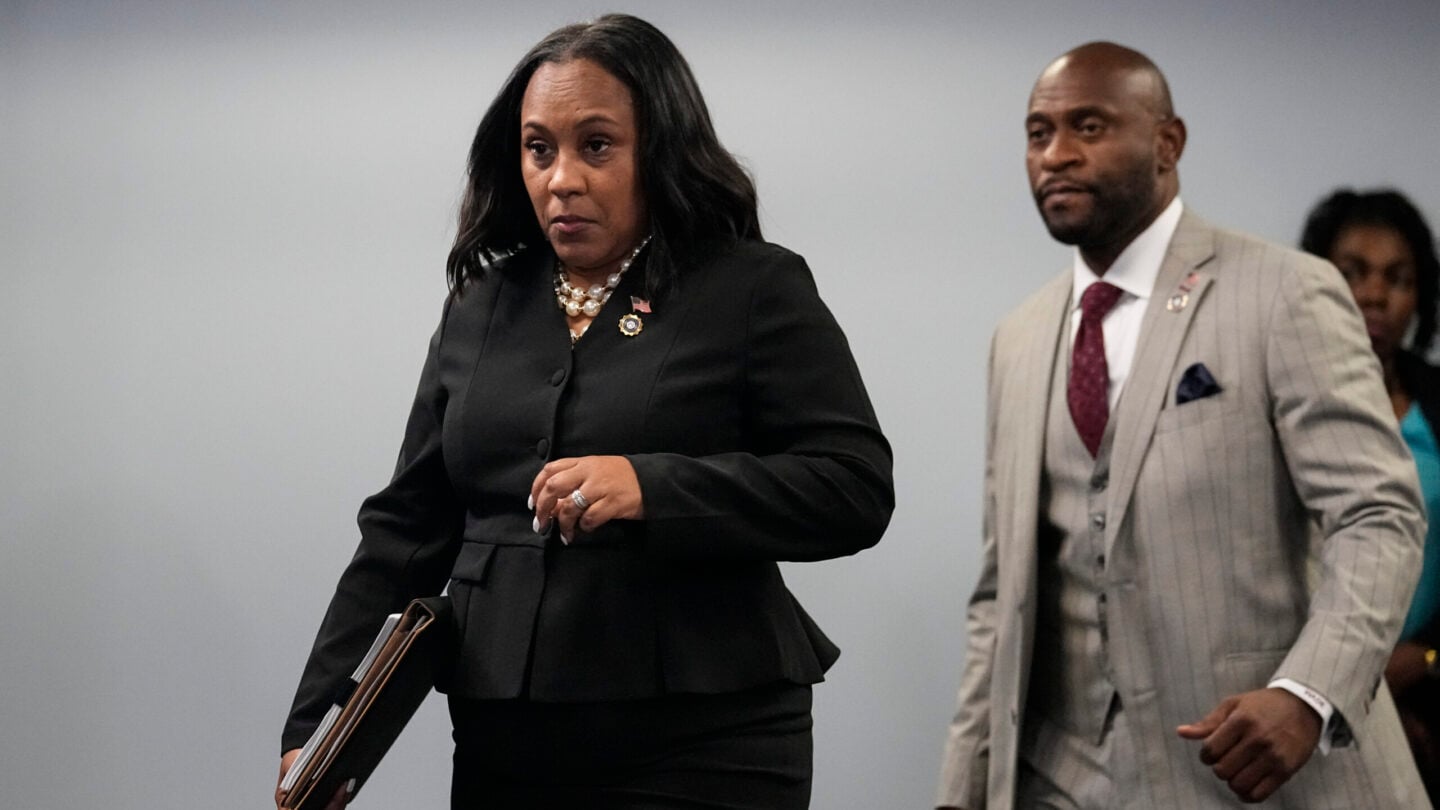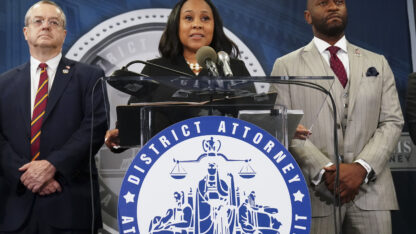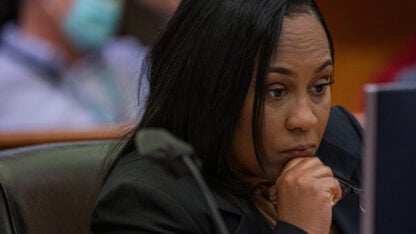This story was updated on Friday at 10:54 a.m.
Fulton County District Attorney Fani Willis is asking a judge to schedule a March 4 trial date in the criminal case against former President Donald Trump and 18 others accused of conspiring to subvert the 2020 election result in Georgia.
Willis’ proposed scheduling order would have arraignments take place the week of Sept. 5 with a trial to begin six months later, the week before Georgia’s 2024 GOP presidential primary.
“I just think, practically speaking, that’s not going to happen,” says Jeffrey Brickman, a criminal defense attorney in Atlanta.
Fulton Superior Court Judge Scott McAfee has been assigned the case and will set the final calendar.
McAfee, who was appointed by Gov. Brian Kemp and has been on the bench since February, will have to juggle scheduling around 19 defendants and their lawyers, as well as proceedings in the three other criminal cases Trump is facing.
McAfee also has to find time on his own calendar — Brickman says Fulton County probably has one of the biggest case backlogs in the state.
“This is not a discussion about people trying to play the system and delay just for the purposes of delay,” Brickman says. “It simply takes a long time and I just think that is wishful thinking.”
Other factors may slow down the case, like protracted jury selection and efforts by Trump and others to move the case out of Fulton Superior Court and into federal court.
“This case has gotten so much attention that it’s going to take a long, long time to impanel a jury,” Brickman says. “19 lawyers who get to ask questions of one juror. So that could take months.”
Removal to federal court
One defendant, former White House Chief of Staff Mark Meadows, has already filed a motion to remove his case to federal court.
That’s because a provision in federal law allows federal officers to remove some criminal prosecutions brought by states to the federal court system.
Jonathan Nash, a law professor at Emory University, says this dates to the early 19th century, when resentment against the federal government over taxation and the War of 1812 led to an onslaught of lawsuits and prosecutions against federal officials carrying out their official duties.
“The concern was that if states are allowed to bring [these] criminal prosecutions, that it can really just interfere with federal officials’ being able to do their jobs,” he said.
Nash says precedent has established three basic requirements for removal to federal court: the defendant must have been a federal officer, facing prosecution for conduct undertaken under the “color of office” and have a legal defense that relies on federal law in some fashion.
“It certainly has some merit, I’ll put it that way,” Nash says of Meadows’ motion to remove the case. “I don’t see it as any kind of frivolous filing. He makes arguments that make some sense.”
If these motions are successful, the Fulton County district attorney’s office would still prosecute the case, but a federal judge would preside. That may end up being U.S. District Judge Steve Jones, who has set an Aug. 28 hearing on Meadows’ motion.
The jury would come not just from Fulton County, but the 10-county Atlanta Division of the U.S. District Court for the Northern District of Georgia, which encompasses some exurban counties that lean more Republican than Fulton County.
Meanwhile, all 19 defendants have until next Friday to voluntarily surrender, and the Fulton County Sheriff’s office says they will be booked at the Fulton County Jail on Rice Street.
Trump initially said he would hold a Monday press conference to present evidence that Georgia’s 2020 election was rigged. Georgia’s election result underwent multiple recounts and audits, every lawsuit alleging fraud failed in court and Trump and his allies have been unable to produce evidence proving widespread fraud in the nearly three years since the election.
Trump later canceled that press conference, citing the advice of his lawyers.
Grand juror threats
In the days since a grand jury handed up the indictment, some of the grand jurors who heard the election case are now being targeted on some far-right message boards. Grand jurors’ names are made public on indictments, per Georgia code, though the document does not specify how individual jurors voted.
The Fulton County Sheriff’s Office said Thursday that it is aware that the grand jurors’ personal information is being shared on various platforms.
“As the lead agency, our investigators are working closely with local, state and federal law enforcement agencies to track down the origin of threats in Fulton County and other jurisdictions,” a spokesperson said in a statement.
“We take this matter very seriously and are coordinating with our law enforcement partners to respond quickly to any credible threat and to ensure the safety of those individuals who carried out their civic duty,” they added.
Pete Skandalakis, executive director of the Prosecuting Attorneys Council of Georgia, says transparency is a bedrock of the justice system, but it’s worth asking whether it’s time to modify the law.
“I think we owe it to our citizens to figure out how we can keep our open court system and yet protect the interests of our citizens,” he says.








